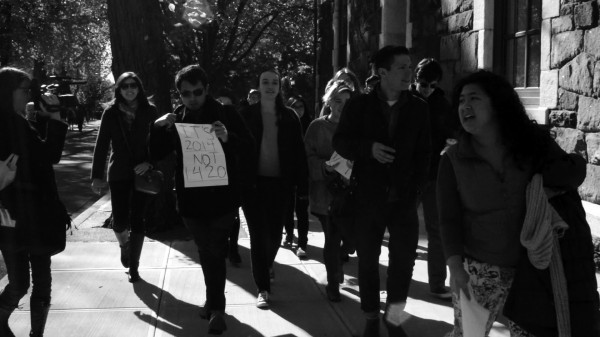Counterpoint: Petition for Sex and Gender Equality for All
November 6, 2014

The Students for Sex and Gender Equality and Safety Coalition (S.A.G.E.S.) has faced opposition from students who either misunderstand their aims or just do not care about women’s health and reproductive rights. To clarify the group’s specific goals, S.A.G.E.S. advocates for free distribution of condoms and access to birth control on campus, gynecological services in the health center, resources for pregnant women, free speech zones, trans-inclusive housing and removal of the infantilizing and heteronormative housing and guest policies.
Some claim that it is unrealistic to ask a Catholic university to change its view on birth control. But all progressive change has come through struggle. The history of this country is littered with institutions founded on bigoted principles of mistreating one group to raise up another. It is still visible today in the broken prison system with its mass incarceration of people of color, as well as undeniably racialized police brutality. The Roman Catholic Church itself used to claim that racial segregation was “demanded by God” but eventually radical churchgoers committed themselves to changing those ideas. The Catholic Church, just like other institutions, only changes when people demand it.
No amount of morality or outdated tradition should be able to infringe upon human rights. Though it may be the opinion of some that use of birth control is immoral, it is simply untrue that sex is only for heterosexuals attempting to reproduce. Though it is enough of a reason in itself, it is also untrue that birth control methods are used only to stop unwanted pregnancies. People use birth control to protect their bodies from sexually transmitted diseases (STDs) and to regulate feminine health issues. Women are told that if they want access to contraceptives and gynecological services, they can seek those things themselves, but the reality is that many people do not have access to these resources. Medical services and birth control can be very expensive, and it is not the duty of the administration to dictate to women what basic measures they can or cannot take to protect their own bodies.
Can the student body, paying millions of dollars for an education in a modern institution, really be forced to conform to the patronizing and arbitrary standards of morality upheld by an out-of-touch administration?
Fordham’s claim to Jesuit values goes beyond the compulsory study of theology and is radically different from attempting to instill compassion and honesty into its students when those values are used as excuses to subjugate women. Whatever “moral opposition” the administration may claim against birth control is self-contradictory because the healthcare plan provided for Fordham faculty does include contraceptive coverage. The government funding of $1.4 million given to Fordham for calling itself a secular school invalidates the privatization of its healthcare policies. Students are allowed to have sex but are paralyzed because they are denied ready access to contraceptives, shamed by so-called Catholic values for wanting or needing abortions and essentially refused accommodations if they have children.
The administration’s failure to coherently respond to S.A.G.E.S. is indicative of their unwillingness to consider their students’ wants and needs, as well as their inability to take the tuition-paying adult women and men seriously. The administration either ignores and silences student voices or passive-aggressively fights against them through subtweeting and fear tactics. The group has received some peculiar backlash—back in September, the Dean of Students at Rose Hill tweeted, “@fordhamSAGES Secret protests are fun, but at college, we debate ideas rather than litter about them. Info for you: http://www.fordham.edu/CARE.” The school has threatened students aligned with this cause to be fired from their Resident Assistant jobs, which disempowers them to engage in social conversations or express their dissatisfaction. The lack of transparency about how students can be punished for protesting is an equally discouraging implicit threat. Fordham knows what its students want and require but so far has not shown that it cares enough about its students to acknowledge or take actions toward fixing its misogynistic policies.









